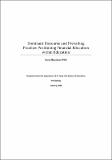| dc.description.abstract | In the last decade of the 20th century, Ireland experienced a period of unprecedented growth in the economy, being dubbed ‘the Celtic Tiger’(Smith). Parallel to this came about significant societal shifts, as a new consumerism began to take hold, and aspirations and ambitions became reality for many people. Much of the new modern reality was afforded through personal debt (Law Reform Commission Of Ireland, 2009), with that debt being made available to those previously excluded from the credit market, and in amounts of potentially questionable sustainability. With the banking collapse of 2008/9, this new wealth began to unravel, and Ireland began to count the cost of the ballooning personal debt crisis that had fuelled our consumerist-led economic growth. Ireland was not alone in this: throughout the western world, governments and people struggled to save what could be saved, whilst simultaneously looking for fault, and looking for remedy. Whilst there was a begrudging acknowledgement of shortcomings in regulation, more attention turned to the role of the consumer, the citizen, the person, in this debt bubble: was it his fault? How could this be prevented from happening again? If the consumer could learn how to act in a particular manner in the market, could such a catastrophe be prevented from reoccurring? Willis (2011a) highlights this particular point:
‘…the logic is that ordinary consumers would have made better mortgage choices and would have accumulated sufficient precautionary savings to weather the recession if they had received financial education.’
Willis in this article illustrates the key point of motivation for this PhD – can financial education provide such protection?
This thesis considers the implications of an approach to financial education predicated on the needs of the market – one wherein an individual is considered to have the capacity to impact significantly on the economy, and who therefore requires financial education to ensure this power is correctly or appropriately wielded. We consider here the financial concepts at play in consumerism and economic activity, and reflect on the role of the individual in this; we explore the impact of education on a person, and examine the philosophy which underpins this; we examine practice in financial education in the western world, and engage with both those who promote it, as well as with the several detractors; lastly we turn our attention to financial education in Ireland, and make recommendations on a path forward which re-positions financial education on the individual as opposed to the economy. | en_IE |


